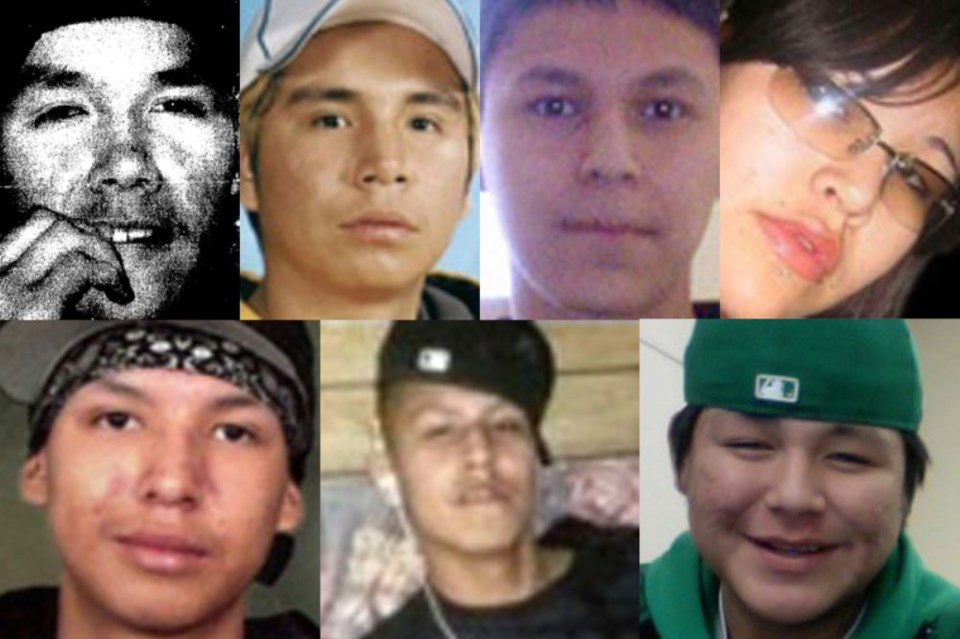THUNDER BAY - Progress on the jury recommendations from the Seven Youth Inquest has improved slightly over last year, but legal representatives for six of the seven family members say actions speak louder than grades and all parties involved will continue to be held to account to ensure Indigenous youth have an equal opportunity to education.
Aboriginal Legal Services presented its five-year report card for the Seven Youth Inquest in Thunder Bay on Thursday.
The overall grade on the implementation of the jury’s 145 recommendations from 2015 rose from a B+ in 2020 to an A- for 2021.
“We are a big proponent of the philosophy of what gets measured gets done,” said Jonathan Rudin, program director with Aboriginal Legal Services. “I think people are concerned with how they are perceived. We are hoping that if we keep grading that people will keep wanting to do things.”
The Seven Youth Inquest was called following the deaths of Jethro Anderson, Reggie Bushie, Robyn Harper, Kyle Morrisseau, Paul Panacheese, and Jordan Wabasse, who’s families were represented by Aboriginal Legal Services, and Curran Strang, who’s family was not represented. All seven youth died between 2000 and 2011 while attending school in Thunder Bay.
Following the inquest, the jury handed down 89 short-term, 39 medium-term, and 17 long-term recommendations to several parties, including the federal and provincial governments, the City of Thunder Bay, Nishnawbe Aski Nation, and Indigenous education providers.
Of all the 145 recommendations, 64 per cent are now considered complete, 31 per cent are in progress, and five per cent are listed as nothing done.
Aboriginal Legal Services assigns an overall grade on the implementation of the recommendations, as well as individual grades for each of the involved parties.
All parties saw their grade either improve or remain the same over last year, with the federal government receiving a B- from a C+, the City of Thunder Bay moving from a B to an A-, and NAN moving from a B+ to an A-. The provincial government received the same grade as last year of a B.
Of the governmental parties, the city of Thunder Bay has the highest completion rate at 90 per cent, while three per cent of recommendations are in progress and 6.5 per cent with nothing done.
“I think the issue for the city is some of the recommendations are directed to do things that they think they’ve done and we don’t think they’ve done,” Rudin said.
Rudin used the example of the jury recommendation to provide training to transit drivers in how to assist intoxicated youth.
“The city of Thunder Bay says we have all sorts of interesting programs and training for drivers about driving but they haven’t actually responded to that particular recommendation,” he said. “The city keeps saying they think they’ve done it, but we are saying they haven’t done it.”
While the overall grade has been improving slightly year over year, Rudin said it is important to focus on the actual changes that have taken place.
Some of the changes that were made very early included providing Indigenous youth in Thunder Bay to attend school more opportunities to return home to visit with family, as well as better training and supports for boarding parents in the city and more addictions and mental health supports in schools.
Rudin said the four education providers continue to excel at implementing the recommendations, with Matawa Learning Centre, Northern Nishnawbe Education Council and Dennis Franklin Cromarty, and Keeywaytinook Okimakanak all remaining at an A+ grade.
“Huge amounts of work have been done to improve the ability of the schools to respond to the needs of their students,” Rudin said. “To me those are the things that are really significant.”
Despite the improvements, Rudin said there are still many families in First Nation communities throughout Northern Ontario who are fearful of sending their children to Thunder Bay to receive an education.
“These are small communities. The loss of a child is felt incredibly profoundly,” Rudin said. “In some cases we are looking at two generations. I don’t know when they are going to be comfortable. I think people will start to feel comfortable when they know they have an option.”
Rudin added that it is a broken system that forces an Indigenous youth between the ages of 15 and 16 years old to have to leave their home community, their family, and their language to travel to a large urban centre just to pursue an education.
“That is still an incredibly difficult transition, so I’m not surprised families are still reluctant,” he said. “That will start to change when there are real options available.”
For families of youth who do want to attend school in Thunder Bay, the progress on the implementation of recommendations is important, but families who are concerned about sending their children away would like to see more community-based education options to keep youth more connected to their home community.
“For those families who are sending kids down there, they see that there are more services and programs,” Rudin said. “For families who are eager to see options that are more based on reserve, they do not see progress.”
Rudin added that Aboriginal Legal Services will continue to offer yearly report cards in an effort to ensure change continues to happen, which is especially important for the 17 long-term recommendations, none of which have been completed but all are listed as in progress.
“I am hoping that reality will keep people focused on moving forward. I don’t want to minimize that the long-term recommendations outstanding, they are tough,” Rudin said.
“The jury’s recommendations are really comprehensive. They should be tough because kids going to school on reserves should have the same opportunities as kids anywhere. But getting that done is a challenge. That we know.”
